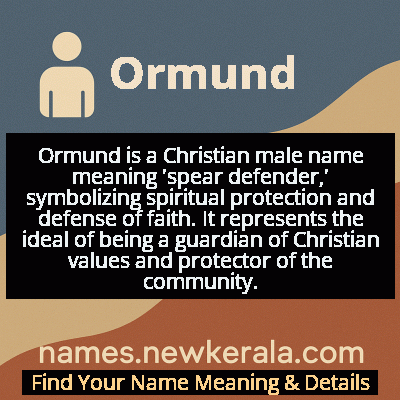Ormund Name Meaning & Details
Origin, Popularity, Numerology Analysis & Name Meaning of Ormund
Discover the origin, meaning, and cultural significance of the name ORMUND. Delve into its historical roots and explore the lasting impact it has had on communities and traditions.
Name
Ormund
Gender
Male
Origin
Christian
Lucky Number
4
Meaning of the Name - Ormund
Ormund is a Christian male name meaning 'spear defender,' symbolizing spiritual protection and defense of faith. It represents the ideal of being a guardian of Christian values and protector of the community.
Ormund - Complete Numerology Analysis
Your Numerology Number
Based on Pythagorean Numerology System
Ruling Planet
Uranus (Rahu)
Positive Nature
Strong sense of order, loyal, practical, and disciplined.
Negative Traits
Stubborn, overly serious, rigid, and prone to feeling restricted.
Lucky Colours
Blue, gray.
Lucky Days
Saturday.
Lucky Stones
Blue sapphire.
Harmony Numbers
1, 7, 8.
Best Suited Professions
Managers, engineers, accountants, organizers.
What People Like About You
Dependability, discipline, practicality.
Famous People Named Ormund
Ormund of Mercia
Anglo-Saxon noble
Christian nobleman who helped establish early monastic foundations in Mercia
Saint Ormund
Christian missionary
Missionary who helped spread Christianity throughout northern England
Ormund the Chronicler
Monk and historian
Benedictine monk who documented early English Christian history
Ormund of York
Church official
Archdeacon who played key role in Norman church reforms
Name Variations & International Equivalents
Click on blue names to explore their detailed meanings. Gray names with will be available soon.
Cultural & Historical Significance
The name gained prominence particularly in Mercia and Northumbria during the 7th-9th centuries, where Christian nobles bearing this name often served as protectors of monasteries and churches. Its usage declined after the Norman Conquest but experienced brief revivals during various Christian reform movements. The name carries the legacy of early English Christianity, representing the fusion of warrior ideals with Christian protection and guardianship, and serves as a reminder of the complex cultural synthesis that characterized England's Christian history.
Extended Personality Analysis
Individuals named Ormund are typically perceived as strong protectors with a deep sense of responsibility and loyalty. They often exhibit natural leadership qualities combined with a protective instinct toward those in their care. Their personality tends to blend traditional values with practical wisdom, making them reliable and steadfast in both personal and professional relationships. There's often an air of quiet strength about them, and they approach challenges with methodical determination rather than impulsive action.
Ormunds are frequently described as having a strong moral compass and a commitment to their principles. They value stability and tradition, yet possess the adaptability to navigate changing circumstances effectively. Their protective nature extends beyond physical safety to emotional and spiritual guardianship, making them excellent friends and family members. While they may appear reserved initially, they develop deep, lasting bonds with those who earn their trust and respect, often serving as pillars of strength within their communities.
Modern Usage & Popularity
In contemporary times, Ormund remains a rare but meaningful choice, primarily among families with English or Scandinavian heritage who appreciate historical Christian names. Its usage has seen a slight increase in recent years as part of the trend toward unique but traditional names, particularly among parents seeking names with historical depth and spiritual significance. The name is most popular in the United Kingdom, especially in regions with strong Anglo-Saxon historical connections, and maintains a steady presence in Christian communities that value names with religious meaning. While it doesn't appear in mainstream popularity charts, it's occasionally chosen by families looking for a distinctive name that honors Christian heritage without being overly common.
Symbolic & Spiritual Meanings
Symbolically, Ormund represents the concept of spiritual guardianship and faithful protection within Christian tradition. The spear symbolizes both defense and spiritual authority, while the defender aspect speaks to Christian ideals of protecting the faith and community. In Christian symbolism, it evokes images of the faithful warrior defending the church and its teachings, carrying connotations of steadfastness, moral courage, and the balance between strength and compassion. The name embodies the Christian ideal of being a defender of truth and protector of the vulnerable, serving as God's instrument of protection in the world while maintaining the humility and service-oriented nature central to Christian values.

